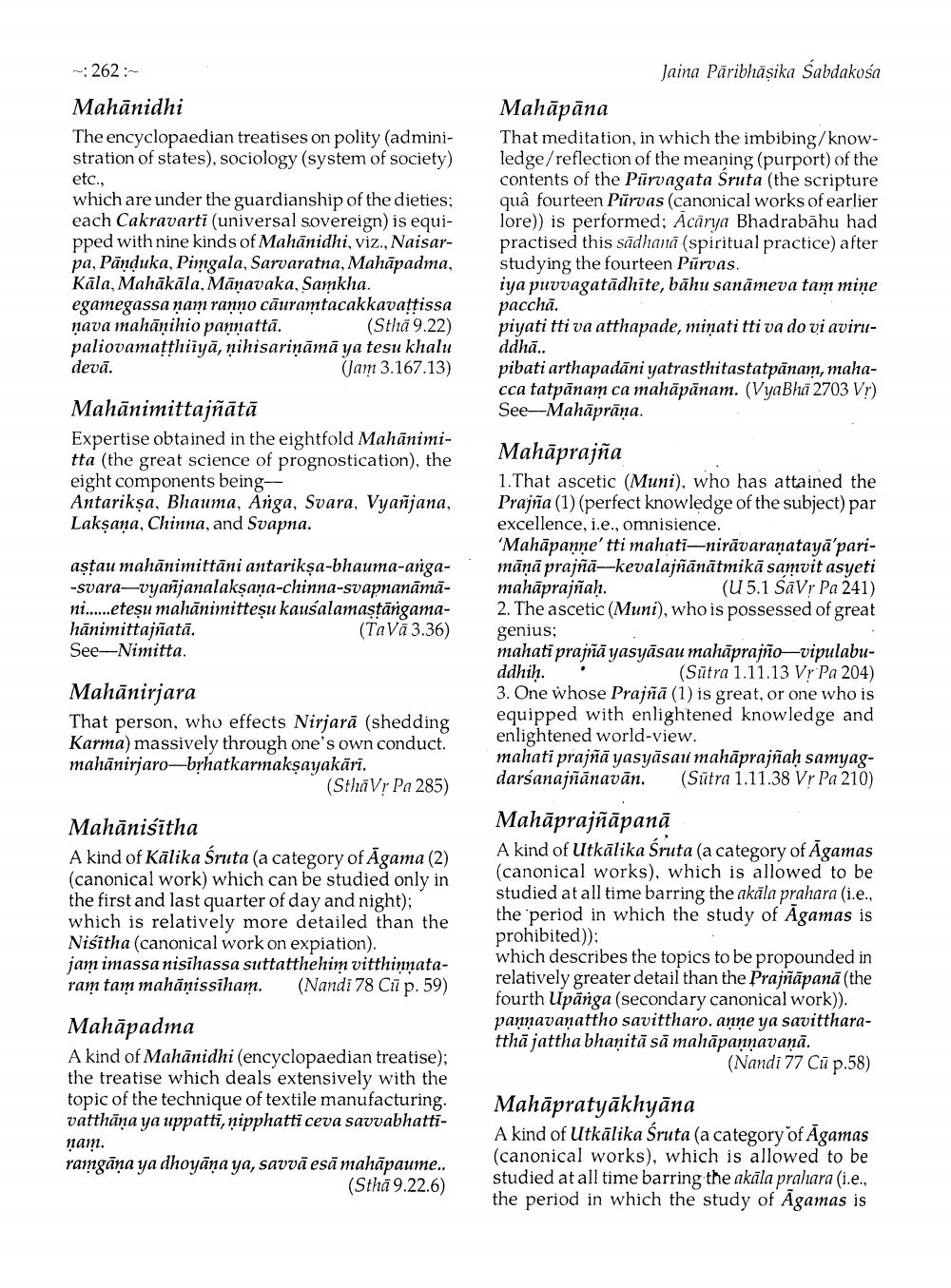________________
Jaina Pāribhāṣika Sabdakosa
262:Mahānidhi The encyclopaedian treatises on polity (administration of states), sociology (system of society) etc., which are under the guardianship of the dieties; each Cakravarti (universal sovereign) is equipped with nine kinds of Mahānidhi, viz., Naisarpa, Panduka, Pimgala, Sarvaratna, Mahāpadma, Kāla, Mahākāla, Mänavaka, Samkha. egamegassa ņam ranno cāuramtacakkavattissa nava mahāņihio pannattā. (Sthā 9.22) paliovamatthiiyā, nihisarināmā ya tesu khalu devā.
(Jam 3.167.13)
Mahāpāna That meditation, in which the imbibing/knowledge/reflection of the meaning (purport) of the contents of the Purvagata Sruta (the scripture quâ fourteen Purvas (canonical works of earlier lore)) is performed; Acārya Bhadrabāhu had practised this sādhana (spiritual practice) after studying the fourteen Purvas. iya puvvagatādhite, bāhu sanāmeva tam mine pacchā. piyati tti va atthapade, minati tti va do vi aviruddhā.. pibati arthapadāni yatrasthitastatpānam, mahacca tatpānam ca mahāpānam. (VyaBhā 2703 Vr) See-Mahāprāna.
Mahānimittajñātā Expertise obtained in the eightfold Mahānimitta (the great science of prognostication), the eight components beingAntariksa, Bhauma, Arga, Svara, Vyañjana, Lakşaņa, Chinna, and Svapna.
aştau mahānimittāni antariksa-bhauma-arga-svara—vyañjanalaksana-chinna-svapnanāmāni....eteșu mahānimitteşu kausalamaştārgamahānimittajñatā.
(Tavā 3.36) See-Nimitta.
Mahāprajña 1. That ascetic (Muni), who has attained the Prajña (1) (perfect knowledge of the subject) par excellence, i.e., omnisience. Mahāpanne' tti mahati-nirāvaranatayā'parimāņā prajñā-kevalajñānātmikā samvit asyeti mahāprajñaḥ.
(U 5.1 SāVr Pa 241) 2. The ascetic (Muni), who is possessed of great genius; mahati prajñā yasyāsau mahāprajño-vipulabuddhih.
(Sūtra 1.11.13 Vr Pa 204) 3. One whose Prajñā (1) is great, or one who is equipped with enlightened knowledge and enlightened world-view. mahati prajñā yasyāsaii mahāprajñaḥ samyagdarśanajñānavān. (Sūtra 1.11.38 Vr Pa 210)
Mahānirjara That person, who effects Nirjarā (shedding Karma) massively through one's own conduct. mahānirjaro-brhatkarmakşayakāri.
(SthāVPa 285)
Mahānisītha A kind of Kālika Śruta (a category of Āgama (2) (canonical work) which can be studied only in the first and last quarter of day and night); which is relatively more detailed than the Nisitha (canonical work on expiation). jam imassa nisihassa suttatthehim vitthinnataram tam mahānissiham. (Nandi 78 Cup. 59)
Mahāprajñāpanā A kind of Utkālika Sruta (a category of Agamas (canonical works), which is allowed to be studied at all time barring the akala prahara (i.e., the period in which the study of Āgamas is prohibited)): which describes the topics to be propounded in relatively greater detail than the Prajñāpanā (the fourth Upānga (secondary canonical work)). pannavaṇattho savittharo. anne ya savittharatthā jattha bhanitā să mahāpannavaņā.
(Nandi 77 Cū p.58)
Mahāpadma A kind of Mahānidhi (encyclopaedian treatise); the treatise which deals extensively with the topic of the technique of textile manufacturing. vatthāna ya uppatti, nipphatti ceva savvabhattinam. ramgāņa ya dhoyāņa ya, savvā esā mahāpaume..
(Sthā 9.22.6)
Mahāpratyākhyāna A kind of Utkālika Śruta (a category of Āgamas (canonical works), which is allowed to be studied at all time barring the akāla pralara (i.e., the period in which the study of Agamas is




